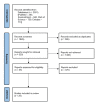Stem Cell Therapy in Critical Limb Ischemia
- PMID: 37575721
- PMCID: PMC10416751
- DOI: 10.7759/cureus.41772
Stem Cell Therapy in Critical Limb Ischemia
Abstract
Critical limb ischemia (CLI), a serious outcome of peripheral artery disease, is frequently associated with morbid outcomes. The available treatment modalities do not provide satisfactory results, leading to marked morbidities such as joint contracture and amputations, resulting in a high economic burden. The peripheral vascular disease tends to cause more morbidity in patients with diabetes and atherosclerosis, given the pre-existing compromised perfusion of medium and small vessels in diabetic patients. With surgical procedures, the chance of vascular compromise further increases, inducing a significantly greater rate of amputation. Hence, the need for nonsurgical treatment modalities such as stem cell therapy (SCT), which promotes angiogenesis, is warranted. In CLI, SCT acts through neovascularization and the development of collateral arteries, which increases blood supply to the soft tissues of the ischemic limb, providing satisfactory outcomes. An electronic database search was performed in PubMed, SCOPUS, EMBASE, and ScienceDirect to identify published clinical trial data, research studies, and review articles on stem cell therapy in critical limb ischemia. The search resulted in a total of 2391 results. Duplicate articles screening resulted in 565 articles. In-depth screening of abstracts and research titles excluded 520 articles, yielding 45 articles suitable for full-text review. On review of full text, articles with overlapping and similar results were filtered, ending in 25 articles. SCT promotes arteriogenesis, and bone marrow-derived mesenchymal stromal cells produce significant effects like reduced morbidity, improved amputation-free survival (AFS ) rate, and improved distal perfusion even in "no-option" CLI patients. SCT is a promising treatment modality for CLI patients, even in those in whom endovascular and revascularization procedures are impossible. SCT assures a prolonged AFS rate, improved distal perfusion, improved walking distances, reduced amputation rates, and increased survival ratio, and is well-tolerated.
Keywords: amputation rates; critical limb ischemia; ischemia; mononuclear cells; stem cell.
Copyright © 2023, Jeyaraman et al.
Conflict of interest statement
The authors have declared that no competing interests exist.
Figures
References
-
- Epidemiology of peripheral arterial disease and critical limb ischemia in an insured national population. Nehler MR, Duval S, Diao L, et al. J Vasc Surg. 2014;60:686–695. - PubMed
-
- Meta-analysis of the prevalence, incidence and natural history of critical limb ischemia. Biancari F. https://pubmed.ncbi.nlm.nih.gov/24126504/ J Cardiovasc Surg (Torino) 2013;54:663–669. - PubMed
Publication types
LinkOut - more resources
Full Text Sources
Medical
Research Materials
Miscellaneous


